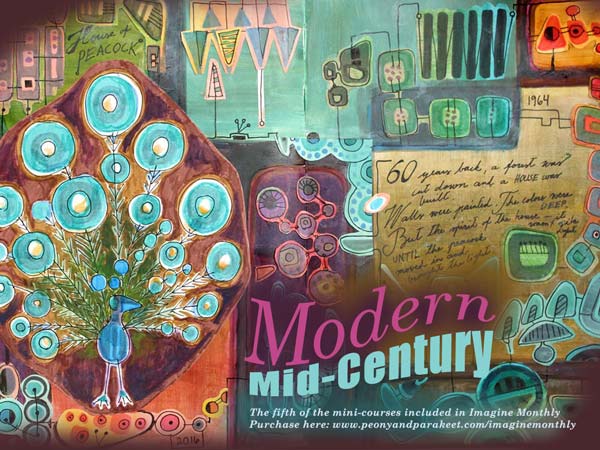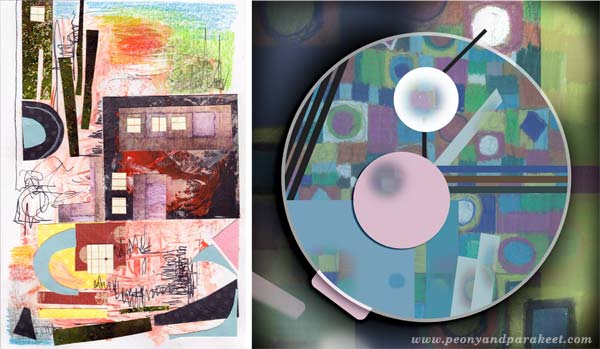What Artistic Direction to Take?
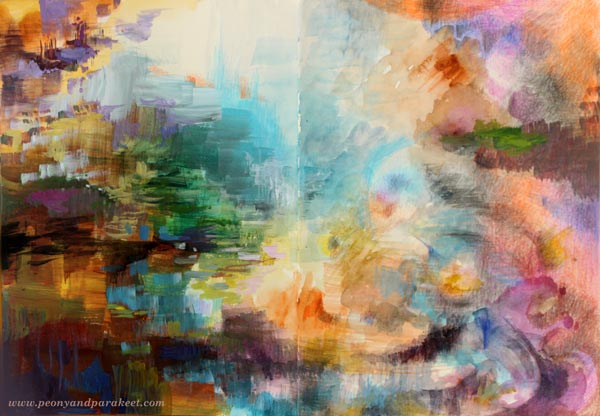
This is my latest art journal spread called “Explorer’s Fountain”. Before showing how I made it, I want to ask you the question that I have been pondering.
When Is the Beginning of a New Phase?
All artists have phases. But how to know when a new one begins? Is creating a continuum or are there certain points when you make the change? Or at least began to change?
I posted this image to Peony and Parakeet’s Facebook page with the text below, and I want to share this here too:
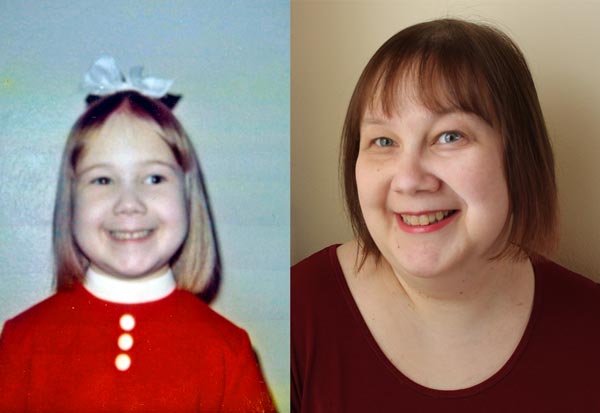
As children, we know what we love. I wanted to be an artist and a teacher. I wanted to write and publish books. I wanted to live with pets. When we grow up, there seem to be more possibilities, and still, they feel less. It’s not much to be a manager when you have dreamed to be an artist. This is how I have felt personally and this is why I think we should do what we have always loved. Because it feels more fulfilling than anything else.
Just recently, art has begun to feel more fulfilling and exciting than ever before. I feel I have new skills, even if I can’t fully point out what they are. I feel I have new thoughts but when I try to grab them, they seem to disappear. My mind is filled with new kind of artistic focus, and still, it’s like it has always been there, now I am just more connected to it. This makes me think that I am experiencing some kind of artistic change, moving from one phase to another.
The changing process is like a rain that starts with small drops. You can then decide whether you go back inside or get out and see what happens!
Learning from Practicing
Teaching classes have been small drops to me. As an art teacher, I see all kind of styles and seek solutions to many kinds of creative problems. I am often so excited about my students and their creations that my own art feels like a secondary thing. But while I have helped people to bring out the best of their skills and get more clarity for their creative direction, it has been a school for me too. It’s like I have got a gift from my students, being able to build my own focus in a new way. So while you have practiced, I have practiced too!
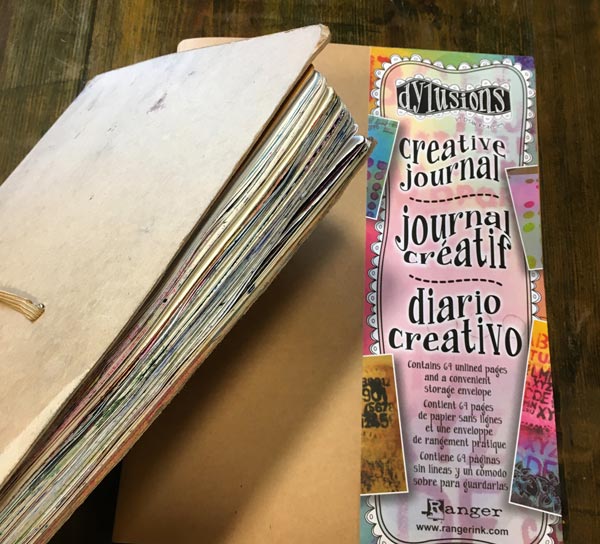
What’s Your Ambition in Art?
I have never understood the controversy between commercial approach and artistic freedom. I think we should search for the best audience to our art and find ourselves through the process. I know most of the people disagree with this. I do understand that many great art pieces wouldn’t have been born with this mindset. But my own ambition of being an artist doesn’t mean creating world-class art and being the greatest of all. I think art as a service instead of end result only. I want to understand how people experience art and develop ways to make creating as fulfilling as possible. – What’s your ambition in art?
Triptych Approach – Create with Me!
Instead of focusing on single artworks, I look for creative concepts and processes. Just recently I got an idea of a triptych. The piece would be created with three different mediums, each taking one-third of the final piece. But this triptych would have soft edges so that it would look like a one piece despite the three distinct elements. Create this triptych with me and while creating, ponder about your artistic direction!
1) Start with Colored Pencils
Color freely with colored pencils so that you fill approximately one-third of the page.
Add few small separate colored areas too.
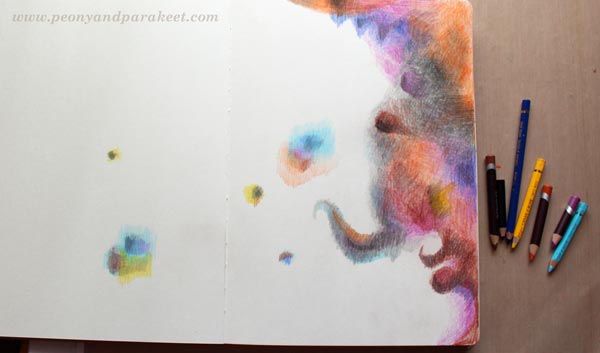
Using Old Pencils
I use Prismacolor and Garan d’Ache Luminance pencils “officially”. For example, all the images of the e-book Coloring Freely have been colored with them. But when I am making a quick spread like this one, I often grab some odd short pencils and use them instead of the fancier ones.
2) Continue with Watercolors
Change to watercolors and paint the second third of the spread.
Try to make the transition from colored to painted areas as soft as possible.
In the end, paint an area that is separate from the main area.
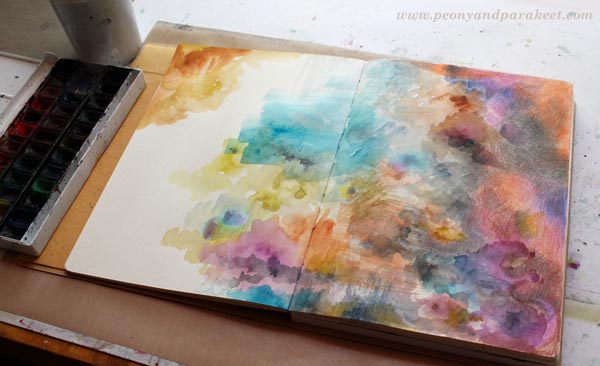
3) Fill the Rest with Acrylic Paints
Paint most of the remaining blank area with acrylic paint.
Add a small painted area on the right where you have colored with pencils. Acrylic paints can be used easily over colored pencils. Don’t cover too much, let every medium show!
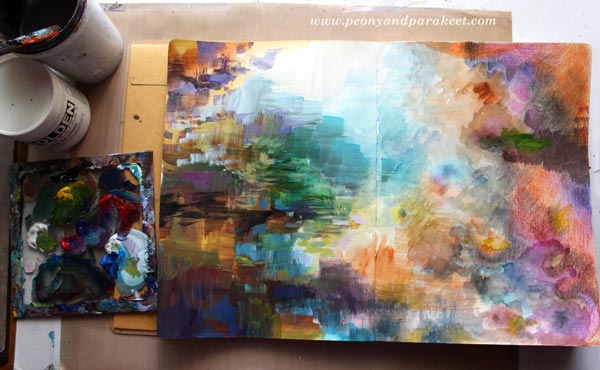
4) Finishing
Go through the whole page and fine-tune the spread with colored pencils and acrylic paints.
Add little details and nuances, don’t repaint the whole page.
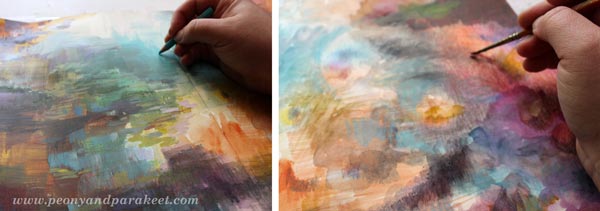
Here’s is my finished spread again.
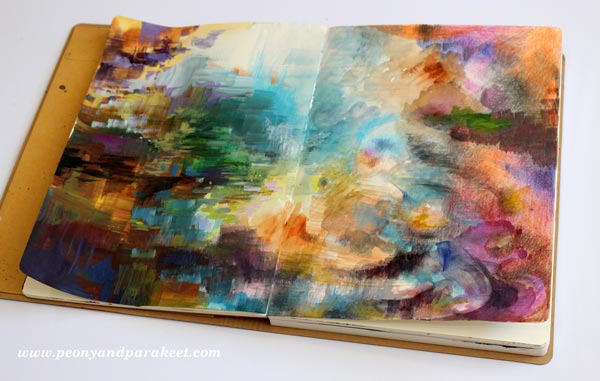
5) Use Leftover Paint
If you still have some leftover paint on a palette, grab a new page and create a quick abstract!
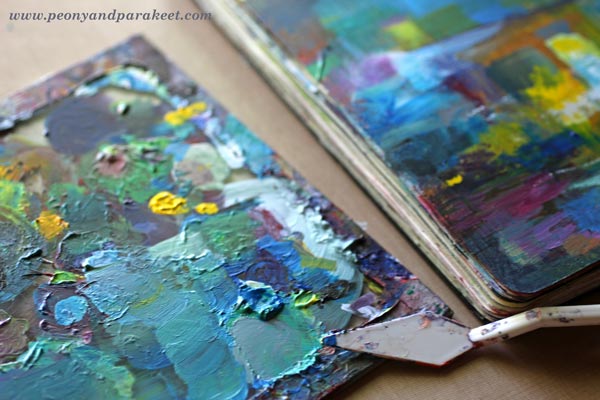
Here’s mine, called “House with a View”.
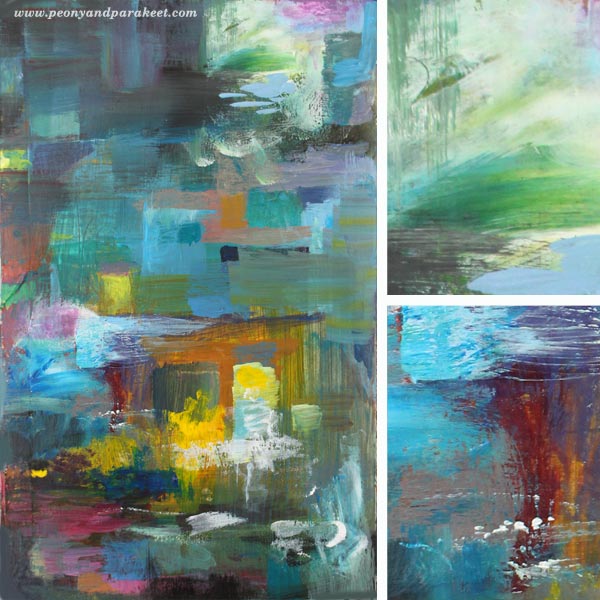
Analysing Artistic Direction
When thinking about artistic direction, it’s natural to analyze what’s good at the end result – what do you want to take from that to move forward. But it’s as important to think about the creative process and analyze that what felt good there.
After analyzing both ways, I think that my direction is this. I have always loved art history. I want it to show in my art but in a fresh way. I want to build bridges between old art created hundreds of years ago and today’s contemporary art. My latest art class Imagine Monthly already does a lot of that. But I also want to grow as an artist so that my personal expression grows stronger and so that I can reach more like-minded people with both my art and my classes.
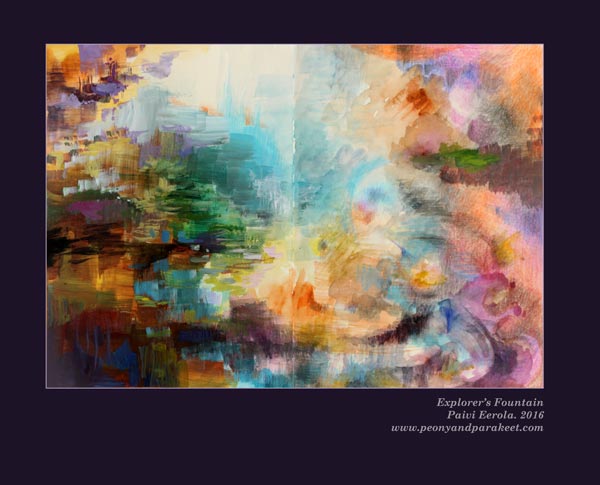
Challenge yourself to find your artistic direction
Sign up for Imagine Monthly Fall 2016!
Mid-Century Modern Style for Art Journals
This spring, I have published a new art journaling mini-course each month for Imagine Monthly. May’s mini-course is called Modern Mid-Century. This mini-course is all about mid-century modern style. You can use it to create decorative art journal pages that are not only flowers and hearts but show a wider range of designs.
Discovering a Magic Formula of Mid-Century Modern
The main inspiration for the Modern Mid-Century mini-course came from Annikki Hovisaari’s ceramic Peacock (“riikinkukko” in Finnish). Annikki Hovisaari was a designer in the Finnish ceramic factory Arabia in 1960s. We have the peacock on the living room wall. I look at it each day, admiring. So much can be expressed with simple shapes and thin lines! The mini-course includes plenty of samples.
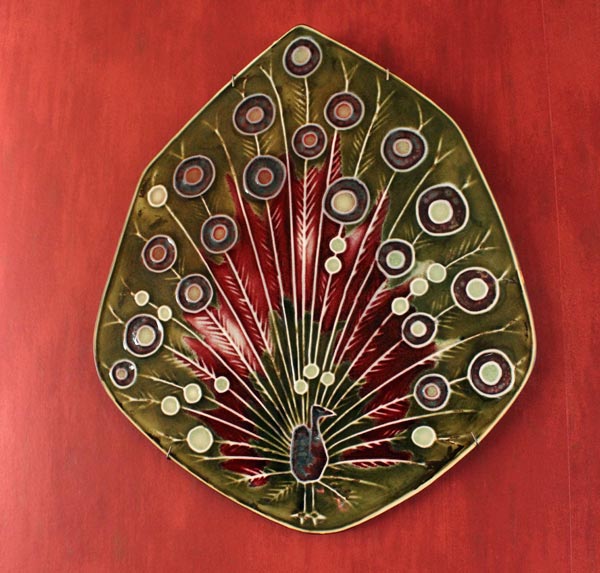
When I begin examining a new style, I try to see what’s essential there. What could be removed without changing the impression. And also: what could be added without loosing it. It’s like calculating a formula for a certain style. The secret is not trying to solve the whole big equation. It would be too difficult and highly argumentative. Even the experts of 20th century styles argue whether something is mid-century modern or not. I try to avoid that and just pick few of the central features. Then I focus on their relationship, forgetting the rest.
The best art classes give you ideas that you can expand and adjust to your liking. Whether you like mid-century modern or not, you can use the basic formula. With that, you can move forward towards your own ideas and aesthetics. This kind of conceptual approach will bring focus to more personal than to the style itself. Instead of trying to follow the style, you will be making new discoveries through it.
I made a couple of small pieces after finishing the mini-course. The first one, on the left below, is a birthday card made for my husband’s nephew. The second is a digital piece combining the idea of mid-century modern and the concept of a watch.
Create Your Own Mid-Century Modern Art
Sign up for Imagine Monthly! You will not only get Modern Mid-Century, but all the mini-courses published so far, immediately after the purchase.
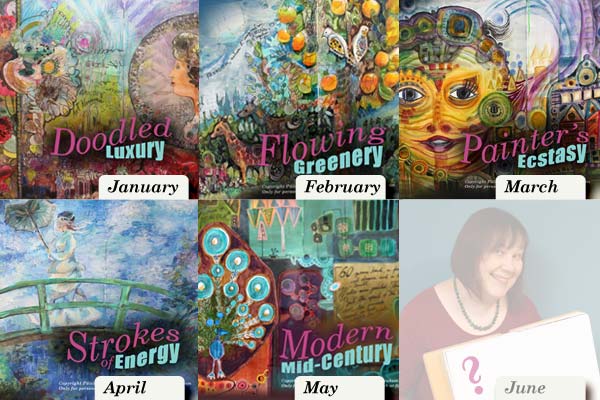
Imagine Monthly also has a private discussion group at Facebook. It’s fun to see what everyone has created from the mini-courses. In the middle of the month, I also lead a discussion topic related to the month’s theme.
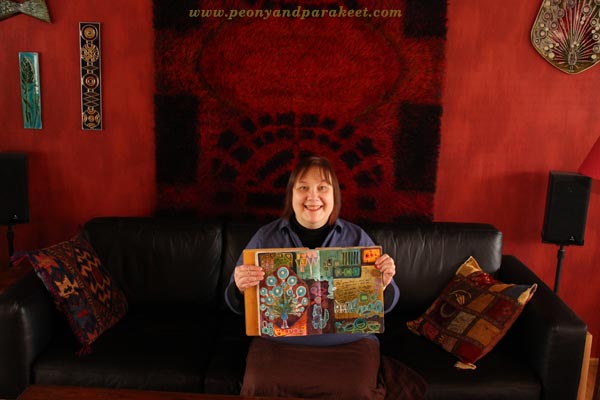
I believe that every art journal needs pages that are handpainted and handdrawn. It is joyful to browse pages that are more like illustrations than just layers of paint. With Imagine Monthly you will get new formulas for stretching your skills and discovering new techniques. Sign up now!
Monet’s World of Energy
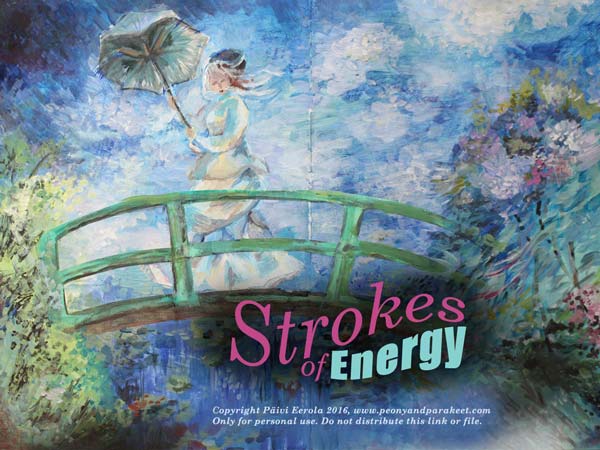
The famous impressionistic painter Claude Monet inspired me to creates this art journaling mini-course. Strokes of Energy has just been released as a part of Imagine Monthly.
Calmness vs. Energy
When I examined Monet’s painting style, I spent a lot of time with calming blues and greens.
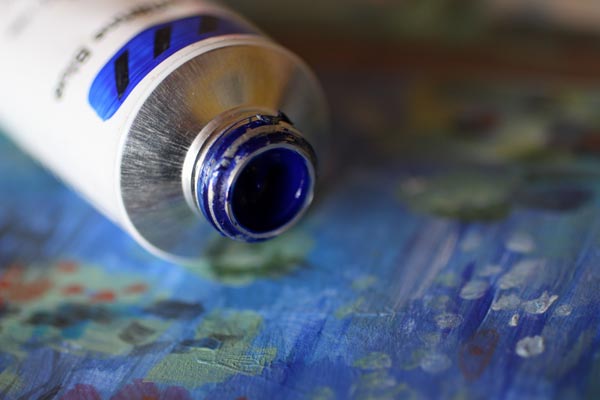
But the more I painted, the more I brought energy into the painting. Even if you feel calm when watching Monet’s paintings, his painting style is much more than just lightly caressing the canvas. Directional strokes and plenty of colors are essential in Monet’s impressionistic style. The most fun part of using the active energy is creating all the juicy details with short strokes of paint.
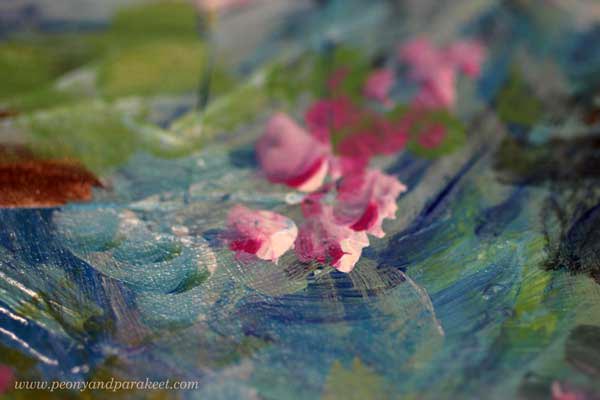
Monet’s Fresh Air to Your Art Journal
A big part of art journaling is about making sketches, experiments and building the collection of pages. But every art journal needs also pages that you want to watch again and again. They are like a breath of fresh air among all not so finished pages.
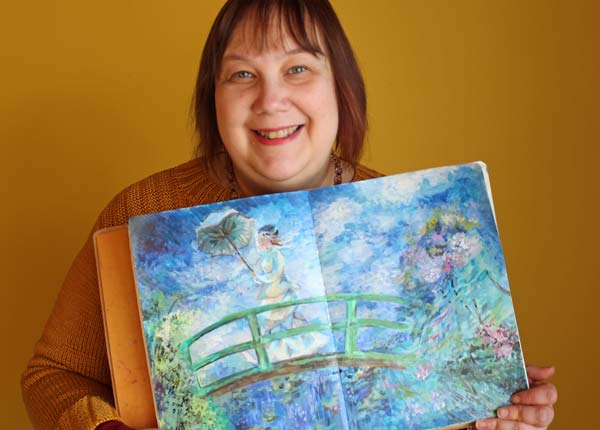
4 Published Mini-Courses, 2 More to Come
Alphonse Mucha, William Morris, Friedensreich Hundertwasser and Claude Monet have been my inspiration for this spring. When you sign up for Imagine Monthly, you will get all these 4 mini-courses right after the purchase and 2 more in the coming months.
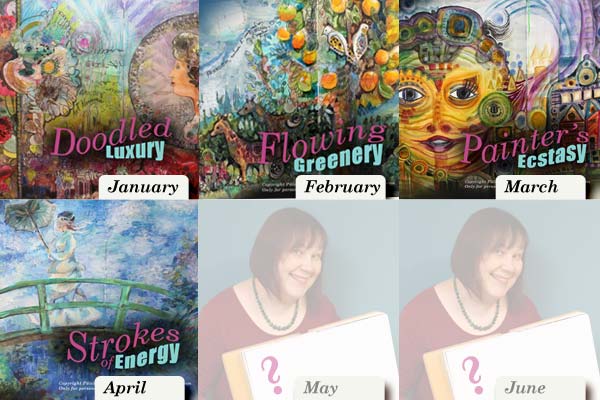
Also, you will get to be a part of a great community! Every week, when I look at the unique versions my students have made from the exercises, I am in awe. I feel extremely lucky to be part of the group and wish all those masters could still be alive and participate the conversation!
>> Imagine Monthly – Sign up here!
From the Students of Liberated Artist
This blog post is dedicated to my painting workshop Liberated Artist.
Read how the students have experienced the class
and enjoy the wonderful art that they have made during the class!
Make Creativity Bloom!
Christie Thomas says: “Every lesson started with a bit of fear, then once started I found that I often set it aside because I could not move on to the next step. I did not “see” anything. But with Paivi’s patient encouragement on the videos and free flowing hands, I watched, listened, and tried to follow the instruction even if it was completely foreign. I finished the pieces and feel excited about my creativity.”
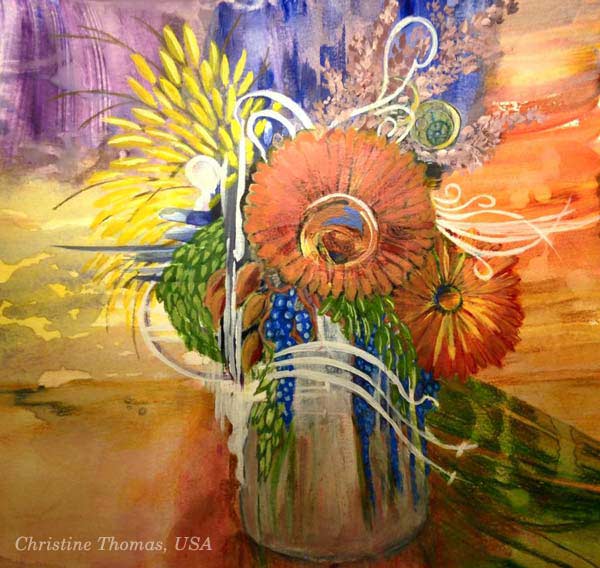
Move Forward with Painting!
Geraldine Norris says: “The course allowed me to move on in my art practice, by being engaged with a teacher who is inspirational, celebrates diversity, creative expression and artistic self acceptance. I now feel I am able to see a sustainable way of moving forward with my painting by having experienced a clear connection with my intuition through the weekly exercise prompts, rather than always wanting to know what work is going to look like finished. In this course I have felt supported on the journey into the unknown and encouraged to make space for the unexpected.”
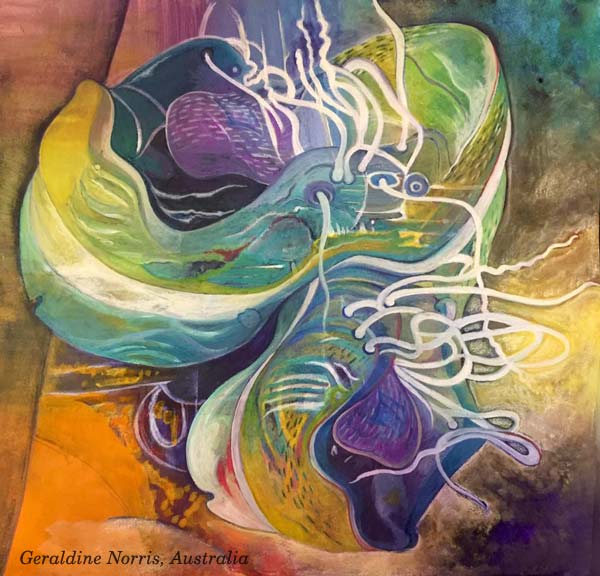
See Art with Fresh Eyes!
Deb Weiers says: “The class made me more open to staying in the struggle, to be willing to walk away and come back with fresh eyes, to be able to wait longer for the art to come through. To stay open to the unexpected.”
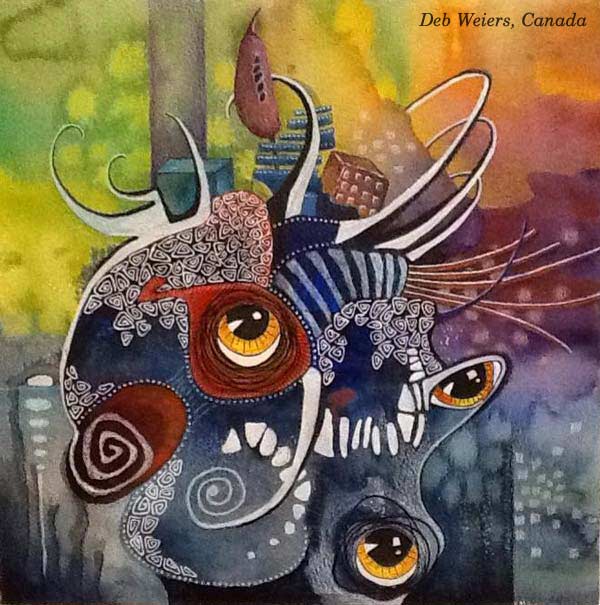
Express What You See and Feel!
Cheryl Rayner says: This class really helped me to see how I could start from ground zero and express something that was personal. I am even encouraged to start art journaling now, which I had always been turned off to, because it seemed like everyone was just trying to see how much product they could use! Paivi’s approach is far more meaningful.”

Let the Painting Grow into a Story!
Karen Nowviskie says: “I am no longer afraid of using watercolors. Most importantly, I have learned to embrace the unexpected and be open to the story of the painting.”

Bring More Elements into Your Creative Process!
Kathy Lewis says: “I am looking at creating so differently. I don’t even know how to start to describe my excitement for this course. I trust the process so much more and look into the colors to see things that I would never have noticed before. The actual coloring process has also changed. I love mixing watercolor, color pencil, and acrylics! Never thought of some of these techniques before this class. Now I want to go through all the lessons again!”
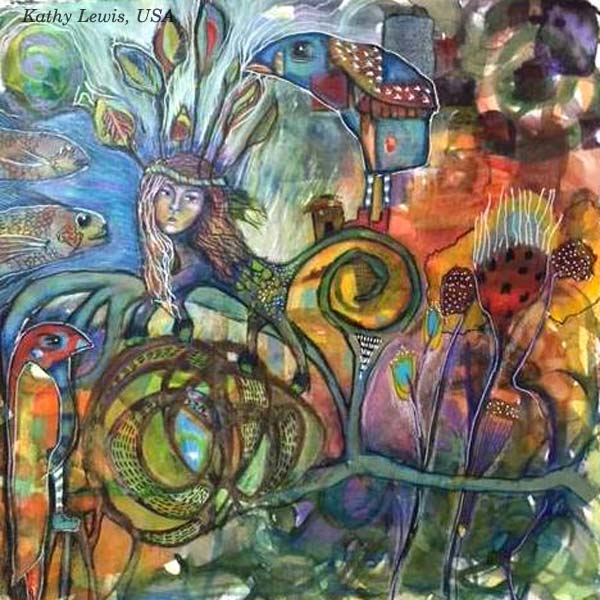
Compose with Colors!
Mackie d’Arge says: “The class inspired me to search harder for the hidden images that appear on the painted page. I’m looking at the balance of colors now instead of just the balance of images and lines in a composition. This class was a pure joy. It was four weeks of anticipation and struggle and frustration and trying again and again…but oh what fun!”
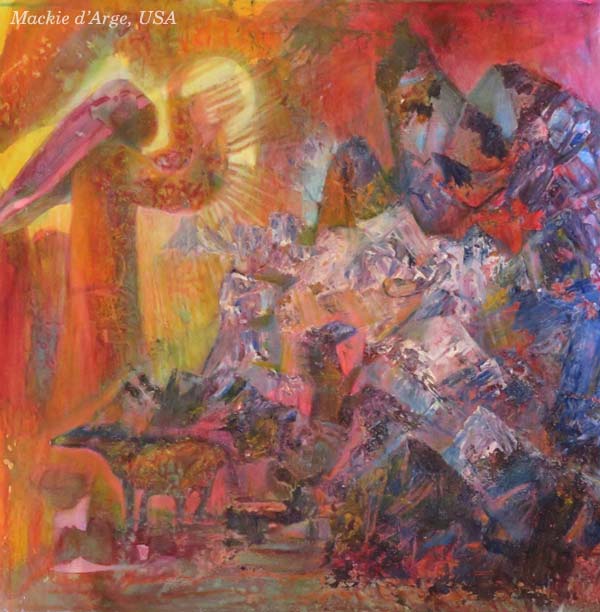
Take Creative Escapes!
Nea Wiseman says: “It’s a wonderful course. I am starting to free up my control buttons!”
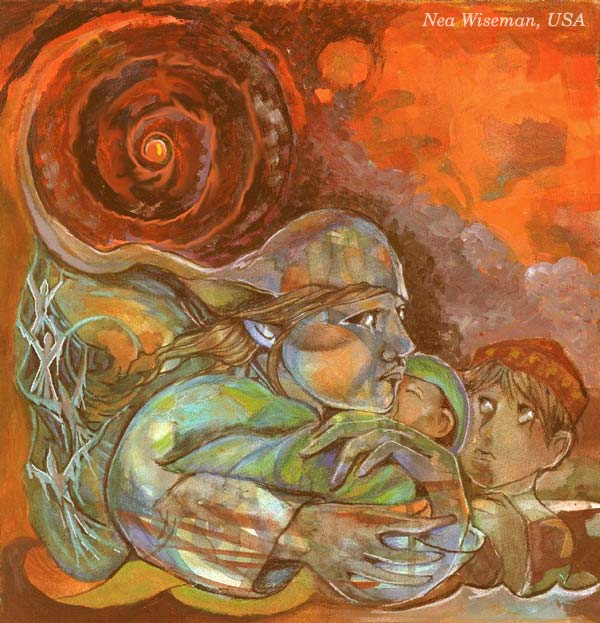
Overcome the Fear of Beginning!
Ulla M. Holm says: “I discovered that I need not be afraid of watercolors, or to start painting. I am beginning to find my own style.”

Express through Painting and Drawing!
Susan Rajkumar says: “Something huge inside of me changed, and then it became much easier to sit down and freely let it flow through me. Suddenly I could draw. Seriously. I don’t think about it much now. This was the best art course online.”
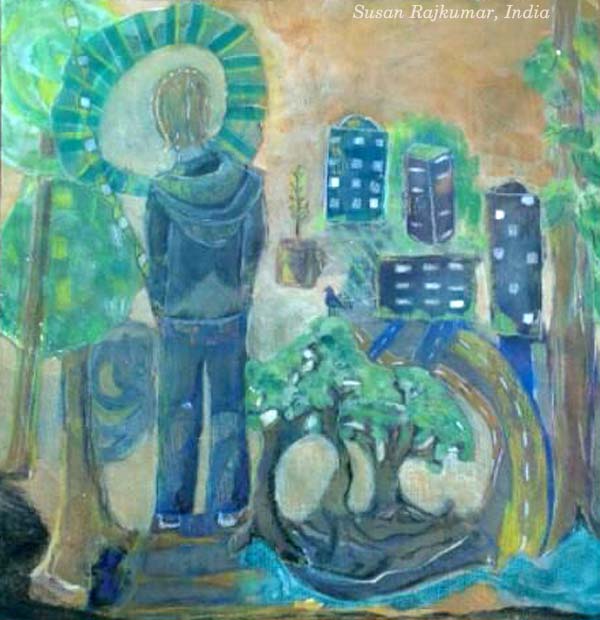
Dive into Art More Often!
Claudia Kern describes: “I expanded my artistic toolbox to include acrylics and pencils which means much more can happen/unfold than working strictly with watercolors. So for me trusting that something as yet unknown to me would emerge and having more tools to use were both liberating. I have learned so much, and the structure of the class has enabled me to make a huge leap forward in making art a part of each day.”
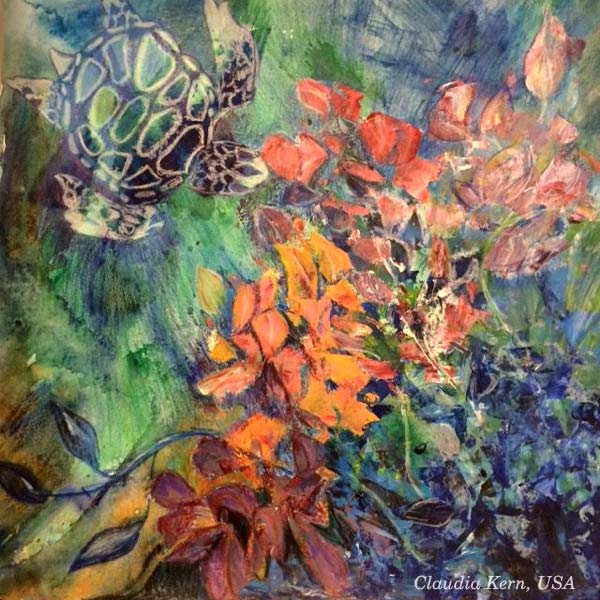
Let Your Thoughts Grow while You Play!
Mary Werner says: “I learned to work in phases both with materials and with slowly completing the painting. I learned to begin with one image without knowing the whole picture allowed a deeper meaning to develop as I was involved with the slow building and thinking of the process. It gave my creativity a chance to play.”
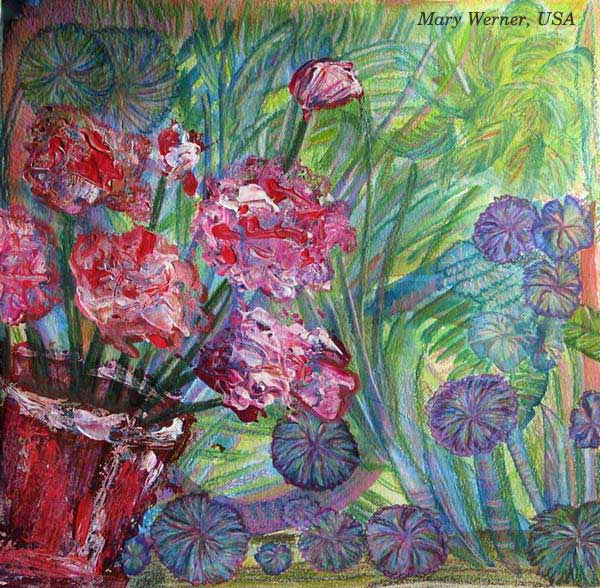
Subscribe to my weekly emails – Get a free mini-course!
